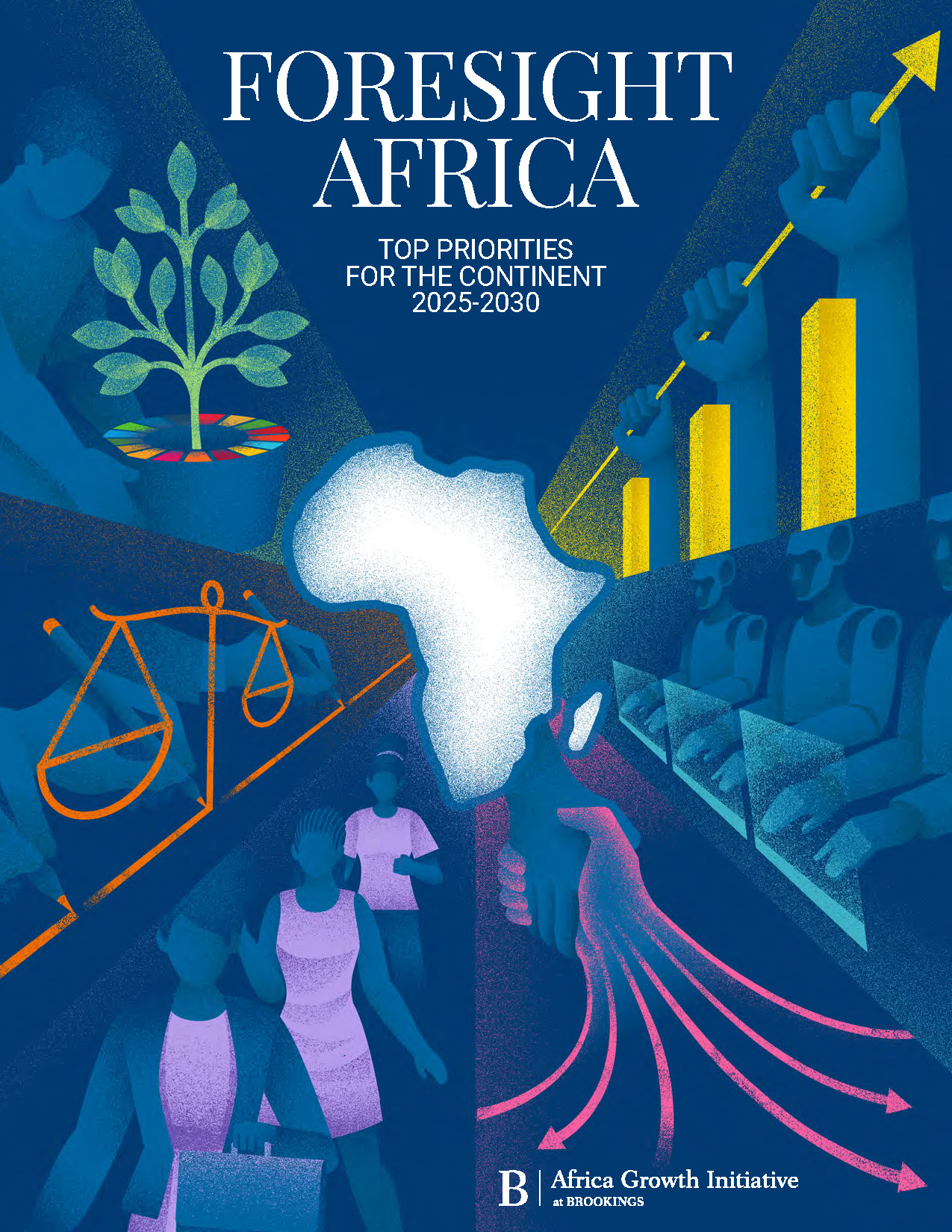Image of the Brookings Institute front cover of Foresight Africa Annual Report 2025
Africa: 2025 Is a Critical Juncture
The Brookings Institute’s Foresight Africa report concludes that 2025 a critical year to address the urgent issues facing the fastest growing continent. The following is an excerpt from the report.
We approach this year’s Foresight Africa report with a great sense of responsibility, recognizing the continent’s growing role in shaping inclusive global prosperity. By the year 2100, Africa will be home to nearly 40% of the world’s population, up from 18.3% in 2025 and 25% in 2050. This demographic shift makes the continent’s sustainable development a priority not just for Africans, but for the entire global community, since Africa’s sustainable development has direct implications for global stability and prosperity.
2025 will serve as a critical juncture for Africa’s trajectory, one shaped by a convergence of factors: new political leadership in both the African Union (AU) and the United States, the urgent imperative to meet the looming 2030 deadline for the SDGs, the need to modernize and renew the Africa Growth and Opportunity Acts (AGOA) set to expire in September 2025, the demand to accelerate the implementation of the African Continental Free Trade Area (AfCFTA), an escalating climate crisis, and the reverberations of conflict and global economic instability. These dynamics require bold and coordinated policy action to address Africa’s unique challenges while leveraging its vast potential.
Africa’s GDP is expected to grow at an annual rate of 4.2% in 2025—up from 3.1% in 2023. The continent is undergoing rapid transformation as its population grows and becomes more urban; meanwhile, its economies are digitalizing and becoming more service-oriented. By 2050, Africa will be home to about 25% of the global population and $16.12 trillion in combined consumer and business spending. Africa is also undergoing the Fourth Industrial Revolution, with rapid adoption and effective deployment of technologies that can help solve some of its most complex economic and social challenges. Yet this overall positive economic outlook can mask regional and local discrepancies that present unique policy challenges. African debt has soared to its highest point in over a decade, with 20 African countries in or at risk of debt distress. Among the top 20 most fragile countries in the world, 14 are now located in Africa. The time is right to maximize impact to solidify and accelerate a positive trajectory for the continent, including with the implementation of the AfCFTA.
This year’s report explores six critical themes, shedding light on the opportunities and obstacles that will define Africa’s future and underlie the policies needed to propel its progress over the period the next five years and beyond. First it needs to harness their internal strengths and reduce reliance on external forces in order to drive sustainable growth from within. Africa’s diversity of strengths—from rising intra-African trade to rich deposits of critical minerals, human capital, and continental financial institutions—can drive its push to meet the SDGs and the Agenda 2063 goals.
Next Africa must accelerate progress toward meeting the Sustainable Development Goals. Reversing SDG stagnation in Africa will require a bold, new strategic approach, adequate and affordable financing, and renewed political commitment. Emphasizing key enablers like technology and energy can boost economic output, spur innovation, encourage value-addition in economic activity, protect the planet, create jobs, and enhance human capital.
Another requirement is to transform Africa’s demographic advantage into greater economic and social prosperity by investing more in women and youth through education, skills training, and entrepreneurship and by dismantling structural biases and barriers that limit their participation in leadership and decision making roles. There are links between economic, social, and environmental prosperity. A brighter future for Africa means ensuring that its youth and women are at the center of its development story.
Effective governance has long been recognized as a cornerstone of sustainable development. This report dives into the state of governance across Africa, with particular focus on how, and to what extent, African governments are meeting the priorities and needs of African citizens.
Artificial intelligence and other emerging technologies are reshaping the world, and Africa is at the forefront, playing a leading global role in their development and deployment now and into the future. This report examines how emerging technologies can address some of the continent’s most pressing challenges, including economic, environmental, social, and governance issues. Alongside opportunities, the chapter warns of risks, including the digital divide, and calls for strategic investments in digital infrastructure and skills development.
Finally, the report explores how African leaders can leverage their growing presence on the global stage, including the African Union’s new membership in the G20, South Africa’s G20 presidency, and relationships with partners such as the United States, China, and multilateral institutions to drive the continent’s priorities.

